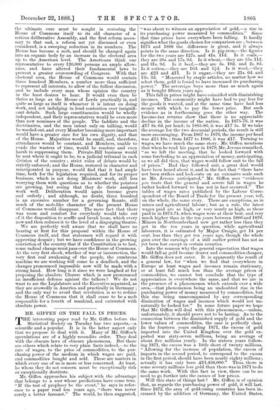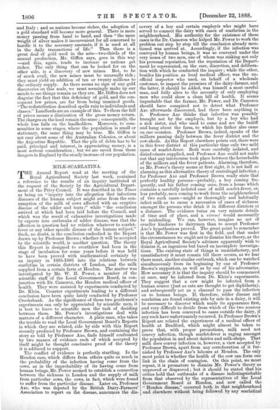MR. GLUTEN ON THE FALL IN PRICES. T M; interesting paper
read by Mr. Giffen before the Statistical Society on Tuesday has two aspects,—a scientific and a popular. It is in the latter aspect only that we propose to deal with it. Many of Mr. Giffen'as speculations are of a highly recondite order. They deal with the obscure laws of obscure phenomena. But there are others which relate to very plain facts indeed,—to the rate of wages, to the price of commodities, to the pur- chasing power of the medium in which wages are paid, and commodities bought and sold. These are matters in which every one of us is more or less concerned. At least, he whom they do not concern must be exceptionally rich or exceptionally destitute. Mr. Giff en approaches his subject with the advantage that belongs to a seer whose predictions have come true. "If the test of prophecy be the event," he says in refer- ence to a paper read ten years ago, "there was never surely a better forecast." The world, he then suggested, "was about to witness an appreciation of gold,—a rise in its purchasing power measured by commodities." Since that time prices have everywhere been falling. It hardly signifies what the goods chosen for comparison are ; between 1873 and 1888 the difference is great, and it always points in the same direction. Is it pig-iron,—the figures for the two years are 127s. and 41s. 11d. Is it coals,— they are 30s. and 17s. 9d. Is it wheat, —they are 55s. 11d. and 31s. 9d. Is it beef, —they are 3s. 10d. and 2s. 8d. Is it cotton,—they are 10d. and 4d. Is it wool,—they are £23 and £11. Is it sugar,—they are 21s. 6d. and 13s. 3d. "Measured by staple articles, no matter how we select them, gold is found to have increased its purchasing power." The sovereign buys more than as much again as it bought fifteen years ago. This fall in prices might have coincided with diminishing incomes. The community might have had to pay less for the goods it wanted, and at the same time have had less money with which to pay the lower price. But such evidence as is forthcoming goes the other way. The Income-tax returns show that there is no appreciable decline in the income of the nation. In 1875-76, it was £17 8s. 6d. per head; in 1885-86, it was £17 5s. If we take the average for the two decennial periods, the result is still more encouraging. From 1867 to 1876, the income per head was £15 10s. ; from 1877 to 1886, it was .k17. Turning to wages, we have much the same story. Mr. Giffen mentions that when he read his paper in 1879, Mr. Jevons remarked, "as we left the meeting, that he looked forward with some foreboding to an appreciation of money, anticipating, as we all did then, that wages would follow suit to the fall of prices." Had they followed suit, a great deal would have been heard about it, and in the fact that "there have not been strikes and lock-outs on an extensive scale such as Mr. Jevons anticipated," Mr. Giffen sees "evidence pro tanto that the general and severe fall in wages he rather looked forward to has not in fact occurred." The tables of wages rates published by the Labour Corre- spondent of the Board of Trade for the present year, tell, on the whole, the same story. There are exceptions, as in mines and agricultural labour ; but as a rule, the latest wages paid are as high, or very nearly as high, as those paid in in 1873-74, when wages were at their best, and very much higher than in the ten years between 1866 and 1876. Miners in Northumberland now get rather less than they got in the ten years in question, while agricultural labourers, it is estimated by Major Craigie, get 14 per cent. less than they got ten years ago, though the whole gain over the earnings of a still earlier period has not as yet been lost except in certain counties.
Into the reasons why the general expectation that wages would fall as gold became dearer and commodities cheaper, Mr. Giffen does not enter. It is apparently the result of a general law, for "when we find that everywhere in Europe at least wages and incomes remain stationary, or at least fall much less than the average prices of commodities, we cannot but conclude that the type of appreciation is everywhere the same, and that we are in the presence of a phenomenon which extends over a wide area,—that phenomenon being an undoubted rise in the purchasing power of money measured by commodities, but this rise being unaccompanied by any corresponding diminution of wages and incomes which would not un- naturally be looked for." In some future paper we hope that Mr. Giffen will deal with this phenomenon,—unless, unfortunately, it should prove not to be lasting. As to the connection between the diminished supply of gold and the lower values of commodities, the case is perfectly clear. In the fourteen years ending 1871, the excess of gold imported into the United Kingdom over the gold ex- ported was sixty-seven millions, being an average of about five millions yearly. In the sixteen years follow- ing 1871, the excess was a little short of twenty millions. "Allowing for the increase of population, the excess of imports in the second period, to correspond to the excess in the first period, should have been nearly eighty millions ; actually it has only been £11,438,000. Thus, there is some seventy millions less gold than there was in 1871 to do the same work. With this fact in view, there can be no need to go further into the causes of low prices.
Will this state of things last ? Mr. Giffen is of opinion that, as regards the purchasing power of gold, it will last. Since 1872, the area of gold-using countries has been in- creased by the addition of Germany, the United States, and Italy ; and as nations become richer, the adoption of a gold standard will become more general. There is more money passing from hand to hand, and then "the mere weight of silver makes it inconvenient for all concerned to handle it to the necessary amounts, if it is used at all in the daily transactions of life." Then there is a, great deal of gold used. in the arts—two-thirds of the annual production, Mr. Giffen says, goes in this way —and this, again, tends to increase as nations get richer. The only thing that can be looked for on the other side, is a discovery of new mines. But, to be of much avail, the new mines must be unusually rich ; they must yield an addition of ten or twenty millions to the ordinary supply. As there seems no sign of any gold discoveries on this scale, we must seemingly make up our minds to see things remain as they are. Mr. Giffen does not disguise the fact that this deficiency of gold, and the con- sequent low prices, are far from being iimmiired goods. "The redistribution described spells ruin to individuals and classes." Landlords are an example of this. To them the fall of prices means a diminution of the gross money return. The charges on the land remain the same • consequently, the whole loss falls on the landholders. iforeover, to com- munities in some stages, where the population is small or stationary, the same thing may be true. Mr. Giffen is not easy about some of the Australian Colonies, or about the Argentine Republic. That the pile of debts has to be paid, principal and interest, in appreciating money, is a most serious consideration; but we are saved from these dangers in England by the steady increase of our population.











































 Previous page
Previous page